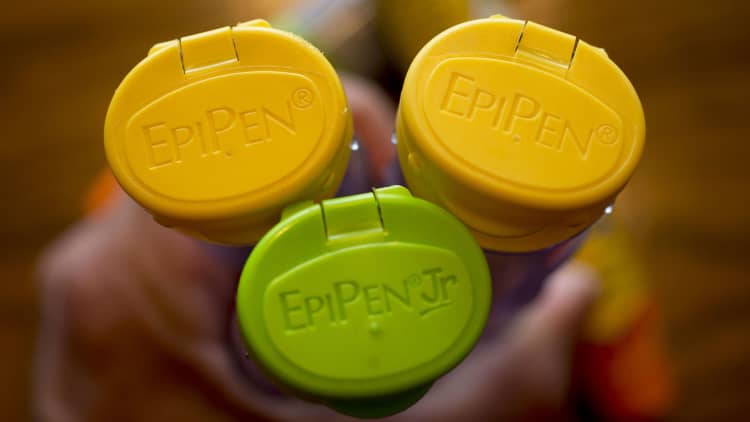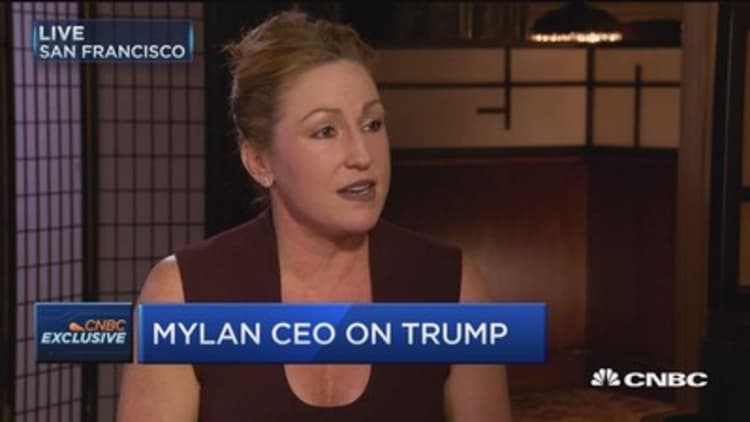
Mylan's CEO said Tuesday that the company has learned from the controversy last year over big price hikes for EpiPen, and that she's hopeful Donald Trump will appreciate moves the pharmaceutical giant has taken to control the anti-allergy device's cost to consumers.
The furor over EpiPen "absolutely has made Mylan a stronger company, me a stronger leader," CEO Heather Bresch told CNBC's Meg Tirrell during an interview broadcast from the J.P. Morgan Health Care Conference in San Francisco.
"I truly understand the outrage when you have no idea what something's going to cost," said Bresch.
She argued that the controversy had focused the issue of hike drug prices though a "patient lens" and created a new "conversation" about what is driving those prices.
"As I step back and try to look at everything ... through this patient lens, it gives a different perspective, and we're continue to apply those learnings.," Bresch said.
"Most importantly, if EpiPen started this conversation, I will try at least to do everything in my power to see if through, and seeing it through means changing the way that pharmaceutical pricing, and ... that patient lens needs to change dramatically."
Asked if she was worried about sustaining direct criticism from President-elect Donald Trump, who has voiced his displeasure about high drug prices and promised to do something about them. Bresch said, "Look, I'm extremely optimistic."
"I believe that obviously he is a very business-minded individual that's very solution-oriented," Bresch said. "You look at how the system works today, you can't help but think it's just, it's not rational."
"We don't have a market-based system for grand pharmaceuticals, and we have a rebate-based system."
"People in the United States are angry, and they don't know who to be angry over [when] making very personal and emotional decisions about products they need, their children need," she said.
"I can't speak to his tweets," said Bresch when asked if she feared being targeted by Trump on his preferred social media platform for criticizing companies, celebrities and critics.
"But what I can speak to is, we took a very decisive action on EpiPen and he appears to be someone who appreciates very decisive and immediate action. So it's how I would hope he would look at what this EpiPen situation was."
Mylan sparked widespread public outrage last summer because of news that the company had hiked prices of life-saving EpiPen more than five-fold since 2008, leaving some customers paying more than $600 out-of-pocket for a package of two of the auto-injection devices.
Bresch at the time blamed a pharmaceutical distribution system that entailed multiple entities — drug makers, pharmacy benefit managers and pharmacies — who all profited from selling medications. She also pointed to an increase in the number of consumers in high-deductible insurance plans, which require them to pay more out of pocket for health services.

But Mylan, stung by criticism, expanded its assistance program for patient purchases. The company also introduced a generic version of EpiPen that is nopw selling for $300.
Along the way, Mylan, after repeatedly denying allegations that it had shortchanged the government-run Medicaid program on rebates for EpiPen, agreed to pay the federal government $465 million to settle such allegations, without admitting wrongdoing.
On Tuesday on CNBC, Bresch said, "Looking back, I think EpiPen started a very important and much-needed conversation in the health-care space ... of just how it works."
CNBC pointed out to Bresch that the major pharmacy benefit manager Express Scripts, which managed drug benefits for insurance plans, denied during the conference that it plays a role in increasing or incentivizing raising the list prices of drugs.
"You know," Bresch said, "when you look at a system where as the manufacturer, as the seller, the one who is owning EpiPen ... and we make less than half of that list price, I think that demonstrates the imbalance in the system."
Despite that disagreement over what is driving price increases, Bresch said, "We have got a great relationship with our customers," when asked about how her claims about pharmacy benefit managers had affected Mylan's relationship with those PBMs.
"You know Myan is much more then EpiPen," Bresch said. "EpiPen is a very important product, but it's down to the mid-single digits in what it means to our revenues."
"When you look at Mylan's portfolio, we have over 630 products just in the United States, over 2,700 globally," she said.
"So you look at the significant role we play in the U.S. health-care system, you know we're a very important player, so we have great relations," Bresch said.
"And it's about our whole product portfolio. I mean our average sales price was 25 cents a dose. Last year ...one of out of every prescriptions filled as Myan medicine, 21 billion doses. That's more than Pfizer, J&J, Merck, Sanofi and Astra all combined."


